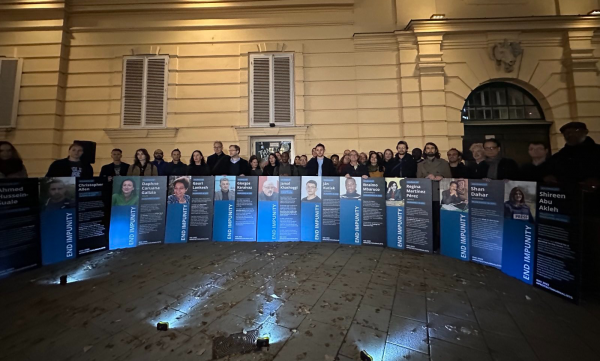Arta FM announced today that local authorities lifted a ban on news broadcasts and would resume regular programming, a day after the International Press Institute (IPI) protested unexplained restrictions placed on the community radio station in northern Syria [see statement below].
“The international attention was very important and helpful [and] made clear that ARTA FM and freedom of media are not alone,” Siruan Hadsch Hossein, general director of Arta, said in an email confirming that the station would be back on the air at 4 p.m. local time.
Authorities on Tuesday ordered staff at the Amudah office of Arta FM, an independent radio serving listeners in a region bordering Turkey, to stop their news and public affairs programming and instead broadcast only music. The Syrian region is under the effective control of the opposition Democratic Union Party (PYD) and has largely escaped the massive fighting that has hit Aleppo, Homs and other western cities.
VIENNA, Feb 19 2014 – A community radio station in north-eastern Syria today suspended all of its programming to protest an order issued by local authorities to temporarily halt its news reports in the largely Kurdish region, the station’s director said.
Authorities yesterday ordered staff at the Amudah office of Arta FM, an independent radio serving listeners in a region bordering Turkey, to stop their news and public affairs programming and instead broadcast only music. The Syrian region is under the effective control of the opposition Democratic Union Party (PYD) and has largely escaped the massive fighting that has hit Aleppo, Homs and other western cities.
“We didn’t get any official reason,” Siruan Hadsch Hossein, general director of Arta, told IPI by telephone from Gaziantep, Turkey. “It’s just a decision to annoy us and we condemn this attack. We don’t have anything to hide …. we do not have any political agenda.”
Hossein said there were 40 employees at the Amudah office of Arta when local Kurdish authorities entered and ordered them to switch to music. There was no confrontation, but the general director, who monitored the intervention by Skype from Gaziantep, said the authorities ordered all but two employees to leave the studios. He said it was the first time the station has faced such interference since it began service in June 2013.
Arta FM broadcasts daily in the Kurdish, Arabic and Syriac languages to an estimated 1 million listeners. There was no programming streaming on its website today. Arta also provides transmission services for foreign broadcasters through facilities in the town of Qamishli, Syria.
Hossein said international organisations could help protect his and other media from interference in the Kurdish-controlled areas of Syria. “They are afraid of publicity and reports by international organisations,” he said. “It’s important to have this support and solidarity.”
IPI Press Freedom Manager Barbara Trionfi called on government and opposition forces in Syria, including those controlling the Kurdish regions, to refrain from targeting news organisations or intimidating journalists.
“In times of conflict, it is vitally important that all voices be heard and that the public has access to independent information,” she said. “Community radio provides an important outlet for the exchange of local news and public services.”
According to the IPI World Press Freedom Review, conditions for journalists worsened as the civil war in Syria approached the beginning of its fourth year, with news workers and media activists routinely falling victim to both security forces and anti-government groups. Local and foreign journalists were vulnerable to kidnapping or arbitrary detention by government security forces and insurgent militias.
Journalists have also paid with their lives in Syria. At least 39 died in relation to their work in 2012, according to IPI’s Death Watch, with another 16 killed in 2013. Syria accounts for approximately one-fifth of the more than 250 journalists who lost their lives globally since the start of 2012.


